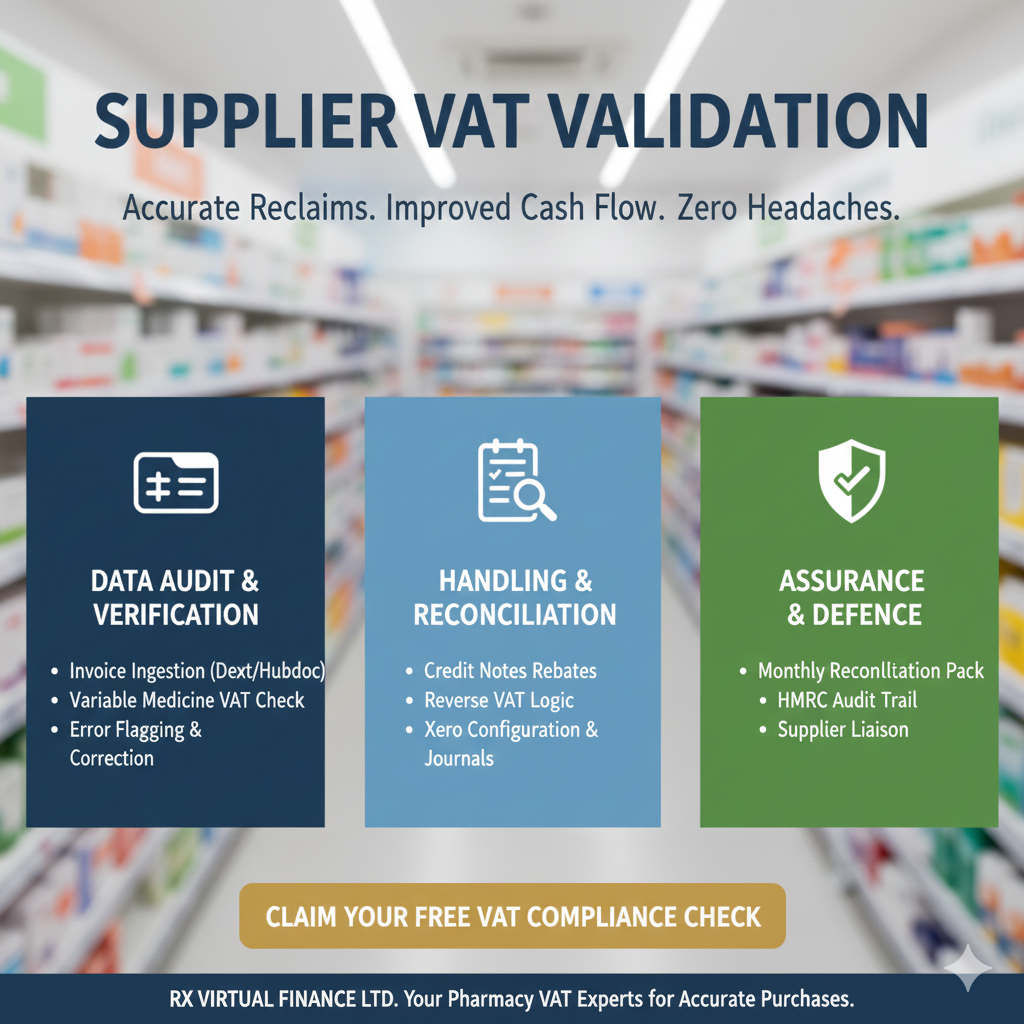Succession planning is no longer optional for family-owned pharmacies. As retirement approaches, pharmacy directors face crucial decisions about how to secure the future of their business. Recent changes to the UK’s inheritance tax (IHT) rules mean that without proper planning, families could face sudden, significant tax liabilities — risking the hard-earned legacy of your pharmacy.
With increasing competition from chains and online dispensers, and regulatory complexities around NHS contract transfers, succession planning ensures your pharmacy transitions smoothly to the next generation or new owners. It’s about protecting both your wealth and the health of your patients.
This guide explains everything you need to know about pharmacy succession planning, including tax strategies, business structures, and staff retention, all tailored for UK pharmacy owners. For growth-focused directors, see how succession planning ties into overall business success in our Pharmacy Growth Planning guide.
What Is Succession Planning?
Succession planning is the process of preparing your pharmacy for a smooth transition of ownership, whether you’re retiring, selling, or passing it on to family. For UK pharmacies, it means protecting NHS contracts, ensuring staff and patients aren’t disrupted, and managing tax efficiently.
Unlike a simple sale, succession planning involves developing a clear strategy for who will take over, how the business will be valued, and how ownership will transfer. It also includes planning for potential tax liabilities like Inheritance Tax (IHT) and Capital Gains Tax (CGT) — which can be significant without careful preparation.
Effective succession planning allows you to maintain patient trust and staff morale while ensuring your family’s financial future is secure. With recent changes to IHT rules impacting Business Property Relief, planning ahead is more important than ever to avoid unexpected tax bills and keep your pharmacy in trusted hands.

Why Pharmacy Owners Start Thinking About Succession
Pharmacy owners often consider succession planning as retirement approaches, but several external factors make it even more important today. Political and economic shifts — including the Labour government’s recent proposals on wealth taxation and stricter immigration rules — are reshaping the business landscape for UK pharmacies. These changes affect staffing, tax liabilities, and even the market for potential buyers.
The new UK Inheritance Tax (IHT) rules, especially around Business Property Relief, could increase tax burdens significantly if pharmacies don’t plan ahead. Additionally, ongoing UK-EU regulatory changes post-Brexit have added uncertainty around medicine supply chains and NHS contract negotiations, making long-term planning more complex.
Other triggers for succession planning include:
- Family considerations — handing over to children or balancing sibling interests
- Rising competition from chain pharmacies and online services
- Managing NHS contract renewals amid shifting regulations
- Staff recruitment challenges under tighter immigration policies
- Protecting staff retention and patient confidence during a transition
- Avoiding sudden tax liabilities linked to political shifts
Key Elements of a Pharmacy Succession Plan
A successful succession plan is more than just a will or a handover letter — it’s a comprehensive roadmap that protects your pharmacy’s future.
A well-prepared succession plan blends financial planning, legal frameworks, tax strategies, and human factors. It’s the best way to ensure your family-owned pharmacy remains a trusted healthcare provider long after you’ve stepped away.
Here’s what every UK pharmacy owner should include in their plan:
Business Valuation and Financial Health
Getting an accurate valuation is the cornerstone of any succession plan. A valuation includes earnings, goodwill, NHS contract value, and stock. According to the National Pharmacy Association, goodwill often makes up over 60% of a pharmacy’s value. A proper valuation not only helps set a fair price but also forms the basis for tax planning — including Capital Gains Tax (CGT) and the new Business Property Relief thresholds under Inheritance Tax (IHT).
Learn how to build a successful growth plan for your pharmacy.
Get insights of True Value of your pharmacy
You’ve spent years building your business—don’t leave the final number to chance. Get a clear, actionable gap analysis that shows you exactly how to bridge the distance between your current value and your maximum potential.
Contact Information
Ownership Structures and Legal Considerations
Whether you operate as a sole trader, partnership, or limited company, your structure impacts succession. Sole traders need to consider how NHS contracts transfer under new UK regulatory guidelines. Partnerships should have clear partnership agreements detailing succession rights. Limited companies might explore share transfers, ensuring eligibility for Business Property Relief (BPR) — which could shield family owners from paying IHT at 40%.
Tax Planning
Tax is a crucial element of succession planning. The 2025 UK IHT rule changes have tightened BPR eligibility, meaning that if your pharmacy is not actively trading — for example, if you lease space or operate as a property investment — your family might face a sudden 40% tax bill. Planning ahead with trusts or family partnership structures can help mitigate this risk. CGT is another consideration; Holdover Relief can defer tax liabilities when gifting the business to family, but only if planned properly.
Talent Development and Management Succession
Who will run the pharmacy day-to-day? Even if ownership is transferred to a family member, they may not be ready to take on the operational responsibilities. A 2024 survey by the General Pharmaceutical Council (GPhC) revealed that 55% of small pharmacy owners struggle to find qualified successors internally. Investing in staff development and creating clear leadership plans ensures your pharmacy continues to operate smoothly.
Communication with Family and Stakeholders
Family businesses can become complicated if expectations aren’t managed. Discuss plans with family members to avoid misunderstandings about who gets what — and when. Communicate openly with key staff to retain their trust and loyalty during transitions. Patients, suppliers, and even local NHS contacts should also be reassured that continuity of care and services is a priority.
Exit Strategies and Contingency Planning
Unexpected events like illness or regulatory changes can derail even the best plans. Contingency strategies, such as preparing the business for sale or considering employee ownership trusts (EOTs), provide flexibility and protect the pharmacy’s legacy. For example, EOTs have grown in popularity in the UK, allowing owners to sell the business to employees tax-efficiently while ensuring the community continues to receive care.
Is your pharmacy exit-ready? We have published a detailed guide.
The Benefits of Planning Ahead
Planning your pharmacy succession early offers both financial and operational advantages that protect your business and your family’s future. With recent UK tax changes, including tighter Inheritance Tax (IHT) rules, forward-looking planning is now more essential than ever. Here’s why getting ahead matters:

- Avoid sudden tax bills. Early planning reduces the risk of unexpected IHT or CGT liabilities, especially with new Business Property Relief (BPR) eligibility rules.
- Maximise business value. A clear succession plan makes your pharmacy more attractive to buyers, investors, or family successors.
- Smooth ownership transition. Planning ensures NHS contracts, staff, and patients experience a seamless handover, maintaining business continuity.
- Retain key staff and patient confidence. Proactive communication with staff and patients builds trust during the transition process.
- Stay compliant. Planning ahead helps you meet NHS contract requirements and GPhC standards, avoiding regulatory setbacks.
- Protect family wealth. Structured tax planning preserves family assets and ensures your pharmacy legacy is secure.
- Link growth to succession. Integrating growth planning into succession increases profitability and offers more options for your exit strategy.
The Role of Professional Advisors in Succession Planning
Professional advisors play a crucial role in creating a seamless succession plan for family-owned pharmacies. Accountants and tax specialists help pharmacy owners navigate complex tax issues like Inheritance Tax (IHT), Capital Gains Tax (CGT), and Business Property Relief. With the UK’s recent changes to tax rules, especially around BPR eligibility, having expert advice is essential to avoid costly surprises.
At RX Virtual Finance, we bring specialist knowledge of the pharmacy sector, ensuring that every succession plan is tailored, tax-efficient, and meets regulatory requirements. Our team understands the challenges of NHS contract transfers, financial reporting, and GPhC compliance. We work with pharmacy owners to structure ownership transitions, protect business value, and plan for the unexpected.
Our services include:
- Business valuations and tax planning to protect family wealth
- Support with share transfers, partnership structures, and trusts
- Guidance on NHS contract transfers and regulatory considerations
- Ongoing financial health reviews to maintain profitability during transitions
How Succession Planning Links to Pharmacy Growth
Succession planning is not just an exit strategy — it’s a key part of sustainable growth. By integrating growth planning with succession, you position your pharmacy to thrive in the long term and protect its value for the next generation. A solid growth plan increases your pharmacy’s worth, giving you more options when it’s time to step back or sell.
Effective growth strategies, such as expanding services, improving financial health, and investing in technology, make your business more attractive to buyers and strengthen family succession prospects. By planning ahead, you align your operational goals with your succession objectives, ensuring a smooth transition that supports both profitability and legacy.
For a step-by-step guide to growth planning, see our Pharmacy Growth Planning blog. This integrated approach helps pharmacy owners build a stronger, more resilient business — one that’s ready for a successful handover.
Legal Considerations in Pharmacy Succession Planning
Legal considerations are critical when planning the future of your pharmacy. A well-structured legal framework ensures that ownership transitions smoothly, NHS contracts transfer properly, and tax liabilities are minimised. Getting the right advice early can save your family time, money, and stress.
Key legal considerations include:
- Business structure: Whether you operate as a sole trader, partnership, or limited company, your structure determines how ownership and contracts can transfer.
- Shareholder agreements: Essential for partnerships and limited companies, these agreements define what happens if an owner exits, retires, or passes away.
- NHS contract transfer: NHS England requires formal procedures for transferring contracts. Legal support ensures compliance and continuity of patient care.
- Partnership agreements: For partnerships, a written agreement avoids disputes and clarifies succession rights, especially with family members involved.
- Will and estate planning: A valid will ensures your pharmacy passes according to your wishes, reducing potential conflicts and tax liabilities.
- Trust structures: Family trusts can manage ownership and support tax planning, protecting your business from high Inheritance Tax bills.
- Compliance with GPhC regulations: Legal advisors ensure that your new owner meets all regulatory requirements, avoiding any impact on NHS contracts and patient services.
GET IN TOUCH
to book your free review and receive exclusive succession planning tips tailored to your pharmacy.

Book your free financial review
FAQs
When should I start succession planning to avoid tax issues?
Pharmacy owners should start planning at least five to ten years before retirement. Early planning helps you manage Inheritance Tax (IHT) and Capital Gains Tax (CGT), especially with the UK’s new Business Property Relief rules.
How do the new UK IHT rules affect pharmacy succession?
The UK’s updated IHT rules tighten Business Property Relief eligibility, meaning some pharmacies may face significant tax bills without proper planning. Pharmacies that rent property or hold investments need to check their structure.
How can I reduce inheritance tax when transferring my pharmacy?
Use Business Property Relief, family trusts, and lifetime gifting strategies. An accountant specialising in pharmacy tax can help you structure your ownership to minimise liabilities.
What’s the best way to value my pharmacy for succession?
A professional valuation includes earnings, goodwill, NHS contract value, and stock. This ensures a fair price and helps manage tax planning effectively.
Can I sell my pharmacy to family members without paying CGT?
Capital Gains Tax may apply even if selling to family. Holdover Relief can defer this tax, but you need to plan ahead with a tax specialist to use this effectively.
How does an NHS contract transfer work in a pharmacy succession?
NHS contracts can be transferred, but strict regulatory processes apply. Planning ensures compliance and continuity of service, so you don’t risk service disruption or patient loss.












